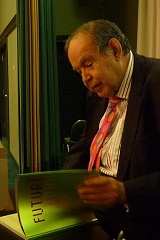 Edit article
Edit articleSeries
The Linguistic Turn: A New Direction in Religious Thinking

Ludwig Wittgenstein (1899–1951), Austrian National Library

Edward de Bono, a leading authority on creative thinking, states that “asking the right question may be the most important part of thinking.”[1] In line with this, I believe that the key to Orthodox resolution of this dilemma involves a radical departure from the modernist “Torah u-madda” approach, which relates to all truth claims of religion cognitively, as simple statements of fact. I submit that this approach has reached a dead end.
Instead, I advocate replacing it with a broader appreciation of the function of religious language in its anthropological context.[2] In other words, instead of questioning whether the doctrine of Torah from Heaven is true empirically, Orthodox believers must rather ask: what is its function in the context of their religious lives. Is its primary concern to discuss history or to fulfill purposes of another sort?
In making this methodological point, I am aligning with a more general phenomenon, known as the “linguistic turn”, which has come to characterize a revolutionary change of focus in contemporary philosophy at large. The impetus for this change was inspired mainly by the thought of the Austrian-born philosopher, Ludwig Wittgenstein, and encapsulated in his seminal observation that all philosophical problems are the product of a confused use of language (see excursus). Philosophical problems, according to Wittgenstein, arise only when we make some systemic linguistic error. Once it becomes clear that the difficulty is essentially grammatical and not a real question about “the way things are”, the problem itself dissolves.[3]
Although Wittgenstein himself did not write anything systematic or detailed regarding the philosophy of religion, many features of his views of language have proven very suggestive for thinking about religion in ways that are quite different than what has traditionally been done. Indeed, it is largely as a result of Wittgenstein’s influence that theological efforts in the past few decades have turned away from the by-now overworked modernist attempts to try and defend religion’s portrayal of reality on an empiric level.
With respect to Christianity where clearly defined doctrine plays a central role, the influence of a cognitively muted view of religion has been embraced more enthusiastically by sociologists than by theologians, while many of the latter still object vigorously to banishing religious dogma from the arena of truth and falsehood. To the extent that Judaism is a religion in which doctrine is more clearly related to practice, a non-cognitive approach appears to bear greater promise for justifying beliefs that cannot be corroborated by the evidence of rational inquiry.
Here too, however, we would do well to consider how far the flight from literal truth claims can be taken in supporting the traditional Jewish belief in a divinely revealed Torah. How is it to be negotiated and what are its implications for Jewish theology at large. It is here that the work of biblical scholars, historians and scientists ends, and the work of philosophers and theologians begins.[4]
TheTorah.com is a 501(c)(3) nonprofit organization.
We rely on the support of readers like you. Please support us.
Published
March 25, 2014
|
Last Updated
March 19, 2025
Previous in the Series
Next in the Series
Before you continue...
Thank you to all our readers who offered their year-end support.
Please help TheTorah.com get off to a strong start in 2025.
Footnotes

Prof. Tamar Ross is Professor Emeritus of the Department of Jewish philosophy at Bar Ilan University. She continues to teach at Midreshet Lindenbaum. She did her Ph.D. at the Hebrew University and served as a post-doctoral fellow at the Center for Jewish Studies at Harvard. She is the author of Expanding the Palace of Torah: Orthodoxy and Feminism. Her areas of expertise include: concepts of God, revelation, religious epistemology, philosophy of halacha, the Musar movement, and the thought of Rabbi A.I. Kook.
Essays on Related Topics:









